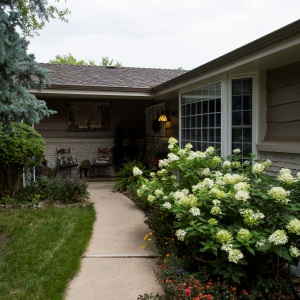Lawsuit stalls Steeplegate Mall demolition and redevelopment

Part of the Steeplegate Mall where Sears once stood, is now fenced off awaiting demolition. Monitor file
| Published: 08-29-2024 5:09 PM |
Demolition of most of the Steeplegate Mall is on hold due to two lawsuits filed by the owner of the land beneath the neighboring TD Bank.
Onyx Partners, the company planning to remake the former mall into a mixed-use housing development with hundreds of apartments, and large-scale retail – including a Costco and maybe a Whole Foods – received approval from the planning board to demolish three-quarters of the structure last month, citing the safety concerns posed by frequent trespassing and vandalism. The project would still need a city demolition permit to begin the tear-down, and it doesn’t yet have planning board approval to begin construction on its full project proposal.
The land that includes the current TD Bank forms a condominium association with the Applebee’s, which is also a separate property owner, and the mall property. Susan Silverman, who owns the bank’s land through a limited liability company, according to business and property records, has filed two lawsuits against the city: one appealing the planning board’s sign-off on the demolition plan and the other appealing variances granted by the zoning board. Claiming in both cases that the boards’ review processes weren’t stringent enough, she asked the court to reverse them. In the planning board case, the court has halted any forward movement relating to the project’s approval.
The City of Concord declined to comment for this story. Attorneys for Onyx and Silverman did not respond to a request for comment Thursday.
Silverman’s suit argues that Onyx’s proposal didn’t meet the standards to get waivers making demolition possible, and lacked details about how demolition would affect the bank. It states that concerns about “urban explorers” trespassing on the property don’t exempt it from meeting those standards.
“If urban explorers and vandalism were the proper analysis for being relieved of the requirements to provide a drainage or erosion control plan then every underperforming property in an urban setting would be entitled to relief,” the suit states.
When granting the variances, the majority of zoning board members found that the difficulty in redeveloping the former mall presented a level of hardship qualifying it for variances. Projects hoping for exceptions must show, among other things, how meeting the city ordinance presents a “hardship.”
“The peculiar characteristics of this lot do create hardship,” Chairman Chris Carley said. “It has to do with the scale of the existing development, the scale of the property itself and the challenges involved in redeveloping it, which relate in my mind to the question of ‘Can you use the property in a reasonable way without a variance?’ ”
Article continues after...
Yesterday's Most Read Articles
 Most New Hampshire homes aren’t ‘aging-ready,’ which is a problem in a rapidly aging state
Most New Hampshire homes aren’t ‘aging-ready,’ which is a problem in a rapidly aging state
 Celebrating National Ice Cream Day with Richardson’s Farm: ‘Nobody else does what we do’
Celebrating National Ice Cream Day with Richardson’s Farm: ‘Nobody else does what we do’
 Don Brueggemann, owner and manager of The Works Café, retires after 30 years downtown: ‘A great run’
Don Brueggemann, owner and manager of The Works Café, retires after 30 years downtown: ‘A great run’
 Riverbend to close adult mental health housing facility in Concord due to funding challenges
Riverbend to close adult mental health housing facility in Concord due to funding challenges
 Surplus seller Ollie’s enters New Hampshire, opens in Belmont
Surplus seller Ollie’s enters New Hampshire, opens in Belmont
 Free speech group, residents back Bow parents’ appeal in case involving transgender athletes
Free speech group, residents back Bow parents’ appeal in case involving transgender athletes
In her zoning appeal, Silverman argued the mall’s new owners don’t have a hardship with the property – rather the current Steeplegate project plans fundamentally don’t work at that site.
“The applicant is in need of 10 variances due to its own unrealistic ‘over’ development plan,” the suit states. “If the applicant created a well-developed and managed plan, the size of the lot would not matter.”
City of Concord Code Administrator David Hall sa id this week the Onyx had not yet requested or received a demolition permit, and the suits mean further delay for the project.







 New Hampshire committee seeks to prevent domestic fatalities like murder-suicide in Berlin
New Hampshire committee seeks to prevent domestic fatalities like murder-suicide in Berlin ‘A little piece of everything I like’: New Pittsfield barbershop brings more than a haircut to downtown
‘A little piece of everything I like’: New Pittsfield barbershop brings more than a haircut to downtown NH judge decides to pause Trump’s birthright citizenship order
NH judge decides to pause Trump’s birthright citizenship order Canterbury honors ‘real heroes’ with updated Military Veterans’ Project
Canterbury honors ‘real heroes’ with updated Military Veterans’ Project
